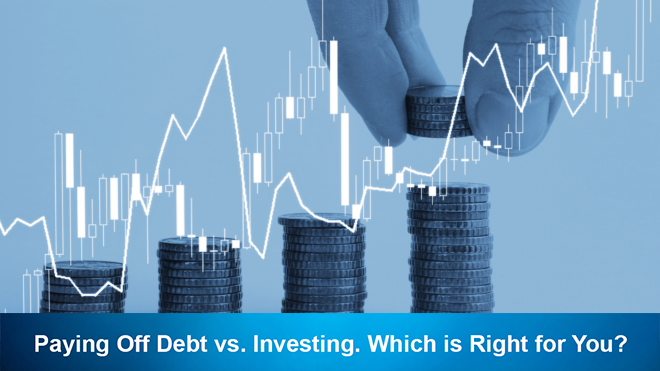Debt can feel like a weight, which can lead you wonder: Should I aggressively pay off my debt or start investing for the future?
It’s a tough question to ask, but one that we’ve all wrestled with at some point: should I pay off my debt or invest my money? The answer is both.
Whether you’re trying to decide between paying off a credit card bill and investing in the stock market, it’s important to understand the difference between these two financial goals. Here’s a look at paying off debt vs. investing your money.

If you’re anything like the average American, you probably carry at least some debt. The Northwestern Mutual Planning & Progress Study found that in 2021, the average American owed $23,325 in debt (above what they owe on their mortgages). What’s more, Americans are spending an average of 30 percent of their monthly income to pay off debt. But did you know there is good debt and bad debt?
Good debt is money you borrow at a low rate of interest, with which you make a high rate of return.
An obvious example is money you borrow to buy an apartment complex. The debt is covered by the rental income – or it will be in a few years.
Bad debt, by contrast, is consumer debt – money you borrow at a high-interest rate to buy things that don’t produce income or grow in value. Things like cars, clothing and vacations.
All of us have done it, and all of us have paid the price.


When it comes to paying off debt or investing, it’s not an either-or situation. Both full debt repayment and adequate retirement planning are important, but they aren’t mutually exclusive.
The rule of thumb is that you should do both: pay debts and invest. In fact, try to consistently contribute to three buckets—debt payoff, retirement, and an emergency fund. Even if that means you can only contribute only a handful of cash each month to retirement or savings in addition to debt payoff, it’s worth doing.
Both full debt repayment and adequate retirement planning are important, but it’s not an either-or situation. If you overcommit to investing and only make minimum debt payments, you could wind up paying too much in interest over time, which can hamper your ability to buy a home or start a family. If you neglect investing entirely, however, you may fall short of your retirement goals.


We all know that you should have an emergency fund, but it’s not always easy to get started. If you’re trying to build up your savings to invest, start by saving a little bit every month. You might want to start by putting $100 in a savings account each month, and then increase that amount as you get more comfortable with the process.
Once you’ve gotten into the habit of saving, it’s time to decide where to put your money. As your income increases, increase the percentage going into savings and decrease the percentage going into emergency funds until they’re equal amounts. This way, whatever turn the market takes, you have a safety cushion with your name on it.

One of the most important things to consider when deciding how aggressively to go after debts is your credit utilization rate. The higher your credit balances, the lower your credit scores. If you don’t get your credit use back under control, you’ll pay higher interest rates when you need to borrow again.
For example if a card balance exceeds 25% of your available credit limit and you can only afford the minimum payment on all debts, you should take a step back and review your budget. Lowering your credit utilization rate and improving your credit score can make your life easier in a lot of ways.


Regardless of your debt situation, you should take advantage of your 401(k) contribution match. It essentially provides you with a rate of return of up to 100%. It also reduces your taxable income and, most important, is one of the easiest ways to prepare for retirement. In general, you should avoid carrying debt into retirement—but some debts are worse than others.
In a worst-case scenario, federal student loan collection can result in garnishment of Social Security income. However, Social Security is typically exempt in bankruptcy proceedings. Never abandon your retirement savings altogether, even for debt paydown, especially as you approach the end of your working life.


You may not be a financial advisor with decades of experience, but there are trustworthy men and women out there who spend their days analyzing the markets so you don’t have to. At the end of the day, the advisor’s mission is to close the gap between where you are financially and where you’d like to be.
You can tap an advisor for a comprehensive investing strategy and more specific services like:
- Household spending review and budgeting (Lifestyle Management)
- Retirement planning
- Recommendations for insurance protection
- Help with estate planning, tax planning, and more.

We all know that it’s important to pay off debt, but there are better ways to accomplish this than throwing every extra dollar you have at the problem. A balanced approach to wealth management serves both today’s needs and tomorrow’s goals. For some that may mean paying off some debt today while simultaneously investing for the future.
Your own needs and circumstances will be unique. Evaluate alternatives and find an approach that fits your situation and goals. Finally, work with your financial advisor at CKS Summit Group to create an investment strategy suited to your individual needs.
Asking the right questions enables us to offer retirement income options for you. So, schedule your complimentary strategy session with us here today!



